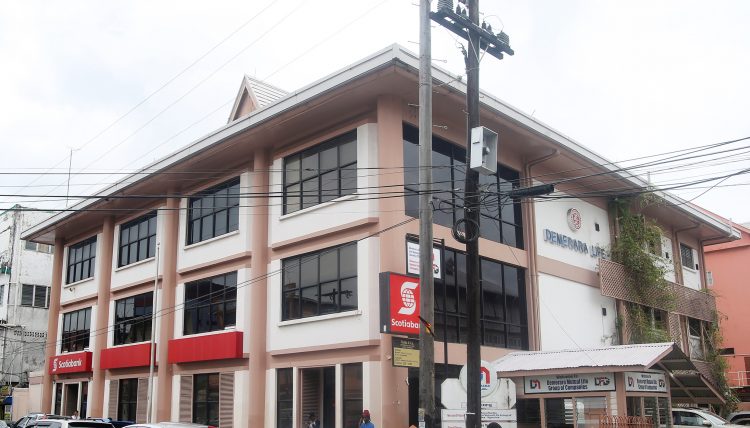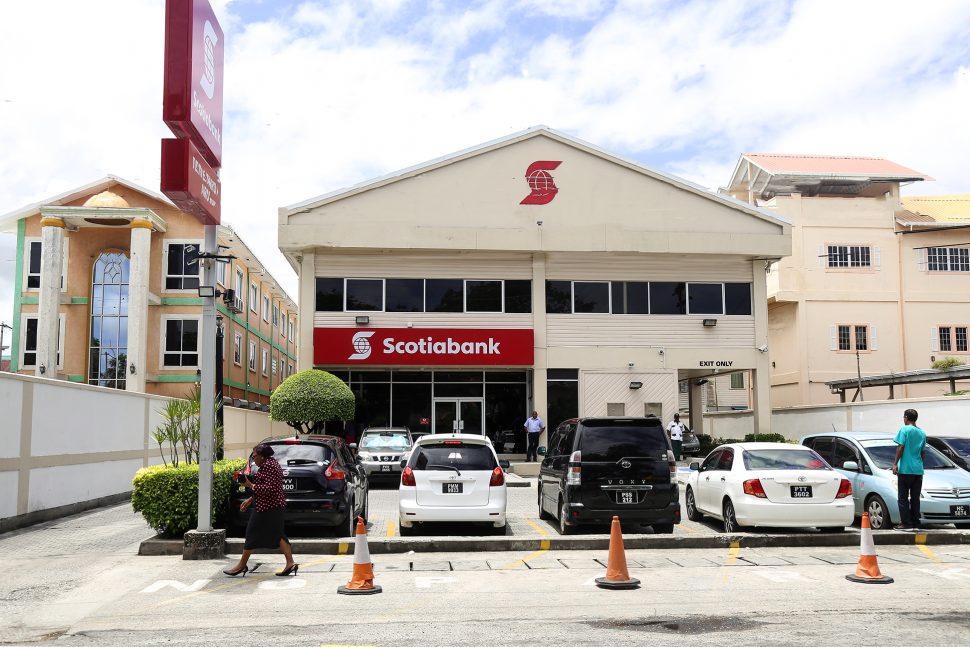Scotiabank yesterday stunningly announced the sale of its Caribbean branches to the Trinidad parent of Republic Bank triggering regulatory concerns from Guyana and Antigua and Barbuda and raising fears among hundreds of workers about their jobs.
Canada-headquartered Bank of Nova Scotia and Republic Financial Hold-ings Limited (RFHL) made separate announcements yesterday morning. Within hours, Guyana’s Ministry of Finance was expressing concern about the announcement and warning that any such acquisition would have to comply with the Financial Institutions Act (FIA) and receive the blessings of the Bank of Guyana.
RFHL in a release from its Port-of-Spain headquarters said that it had entered a pact to acquire Scotiabank’s banking operations in Guyana, St. Maarten and the Eastern Caribbean territories, including Anguilla, Antigua and Barbuda, Dominica, Grenada, St. Kitts and Nevis, St. Lucia, and St. Vincent and the Grenadines.

The purchase price, it said, is US$123 million, which represents US$25 million consideration for total shareholding of Scotiabank Anguilla Limited; and a premium of US$98 million over the net asset value for operations in the remaining eight countries. It said that the price does not include any amounts required to capitalise the branches post-closing. It said that the agreement, executed yesterday signalled the commencement of a transaction that is subject to all regulatory and other customary approvals and conditions.
Ronald F deC. Harford, Chairman of RFHL, said “This acquisition represents another major milestone for the Republic Group. As we grow and acquire significant positions in our existing markets, it is important that we continue to broaden our footprint, regionally and internationally. This agreement, which is subject to all regulatory approvals, affords us the opportunity to reach more clients in the Eastern Caribbean and Guyana, two markets we are familiar with, and build new relationships in St. Maarten. We are confident that our expanded presence or entrance in those markets will redound to the benefit of Scotiabank’s clients and employees as well as Republic’s existing stakeholders. I would like to thank Scotiabank for the confidence expressed in our ability to look after their valuable clients, and we are pleased that all impacted employees of Scotiabank in the 9 countries will join the Republic Group.”
The breathtaking deal clearly took Guyana and Antigua by surprise.

Guyana’s Ministry of Finance emphasied that the takeover was not Guyana-specific but is part of a region-wide refocusing by Scotiabank.
It noted the statement by Republic Bank that the agreement is “subject to all regulatory approvals”.
The ministry said that the FIA has clear stipulations regarding ‘acquisition of control’ and requires the approval of the Bank of Guyana following the submission of an application and due diligence being conducted.
It further noted that the FIA also addresses the issue of ‘fundamental changes’ as it relates to mergers and transfer of assets or liabilities.
It added that the agreement raises a number of issues for the banking sector in Guyana and for the public which the Ministry of Finance, the Bank of Guyana and the Government of Guyana will need to carefully analyse.
These issues include:
Republic Bank (Guyana) Limited currently holds 35.4% of the banking systems assets and 36.8% of deposits and the acquisition Scotiabank here will up this to 51% of both assets and deposits. The ministry said that this raises concerns about an over-concentration of banking services, market domination and the ‘too big to fail’ risks.
The effect on competition and the potential for Republic Bank to have too much influence on pricing of banking products and rates also has to be weighed.
Issues related to correspondent banking options was also cited by the ministry.
Loss of jobs with Republic Bank likely to consolidate branches was also pointed out by the ministry.
The ministry said that the Scotiabank decision, which is made when Guyana’s economy is on the brink of financial transformation with the onset of a new oil and gas sector raises concerns and is regretted.
“The Ministry of Finance wishes to assure that it will continue to stay abreast of this matter, will act in the best interest of the Guyanese people and will issue subsequent updates as necessary”, the statement said.
Divestment
Over in St John’s, Antigua Prime Minister Gaston Browne fired off a letter yesterday to Suzan Snaggs-Wilson, General Manager of the Scotiabank there warning that it needed to apply to the government for approval for divestment and that such divestment should be offered first to local banks.
Browne, also the island’s Finance Minister, referred to a call that he had gotten from Snaggs-Wilson on Monday at the time that the Bank of Nova Scotia had made the announcement in Canada.
“On behalf of my Government, I advise that I am deeply disappointed that the authorities of the Bank of Nova Scotia would decide to sell its operations in Antigua and Barbuda without any form of consultation with the regulators of the Finance Minister, whose agreement and authority for such a sale are required by law.
“I am further deeply concerned that the Bank of Nova Scotia would spring such an important decision on the people of Antigua and Barbuda, particularly its many clients who have displayed great loyalty to the bank for almost 50 years, providing it with significant profits.
“…I hereby inform the authorities of the Bank of Nova Scotia, through you, that their decision to sell the operations in Antigua and Barbuda, without the requisite consultation and agreement of the regulators and the Government…is unacceptable.”
The Prime Minister further warned that should the Bank of Nova Scotia wish to divest, it would be necessary to seek government’s approval. In this regard, he said that his government would strongly urge that the divestment be offered first to local banks.
“Indeed, I am aware that, notwithstanding the unexpectedness of..(the) announcement, a consortium of such banks has already expressed an affirmative interest to acquire”.
Browne said that his government now expected a formal application by Bank of Nova Scotia for the terms of any divestment including reasonable time to identify new prospective local owners and a reasonable time to observe.
No guarantee
In Georgetown, Scotiabank employees were in shock at the announcement, aware that there was no guarantee that in the takeover by Republic that their jobs would be safe.
When contacted, Raymond Smith, who has been serving as country manager for Guyana since 2015 referred this newspaper to Scotiabank’s Senior Vice President and Head, South and East Caribbean, Stephen Bagnarol in Trinidad.
However, further instructions were given to contact the bank’s Head of Marketing, Caribbean South and Product Delivery, Caribbean South and East, Kameel Baksh-Edwards, which proved futile.
Meanwhile, this newspaper was informed that some staffers of the Bank had been given notice of the move some time ago, while others who only found out yesterday morning described the news as shocking and sad.
For some of those who got the news yesterday, the move is accompanied by a number of fears regarding job security, even though they were assured that the acquisition makes provisions to retain both Scotia Bank employees and customers.
The fear, as related to this newspaper comes with the possibility of RFHL wanting to downsize, which could ultimately result in persons being laid off, others however, are confident that the situation will progress with consideration for the staff. None of the employees wanted to go on record.
Scotiabank- or Bank of Nova Scotia – has been operating in Guyana since 1968, during which time it opened its first branch in Georgetown.
At present Scotiabank has four branches located in New Amsterdam, Bartica, Robb Street in the city which also houses the Country Manager’s office and Carmichael Street.
Asset base
RFHL’s statement said that Republic Group’s total asset base as at September 30, 2018 stood at US$10.5 billion, with equity at US$1.5 billion and profits attributable to shareholders for the year ended September 30, 2018 of US$198 million. This acquisition will increase the Group’s asset size by approximately US$2.5 billion.
“Scotiabank is proud to work with the Republic Group – a leader in financial services in the Caribbean who is well positioned to invest and grow the business, and to provide customers across the region with leading financial solutions that meet their needs,” said Ignacio (Nacho) Deschamps, Group Head, International Banking at Scotiabank.
Harford said that RFHL’s focus on seeking out expansion opportunities in the Caribbean is a testament to the Group’s confidence in and commitment to the Caribbean region. He added, “We have a proven track record of adding value to the markets we enter, and we look forward to partnering with the teams in these territories to deliver excellence in customer satisfaction, employee engagement and social responsibility.”
Republic Bank here had acquired the customer base of the Guyana National Co-operative Bank when it was privatized in the 1990s.
According to Reuters, Bank of Nova Scotia yesterday reported fourth-quarter earnings which were marginally below expectations . It reported that the bank, which has operated in the Caribbean since 1889, said that it would realign its business in the region by selling its insurance operations in Jamaica and Trinidad & Tobago to Sagicor Financial Corporation, with whom it will partner to sell insurance products in those countries.
The transactions, it said are not material to Scotiabank, it said, but will result in its core tier 1 capital ratio, a key measure of its financial strength, increasing by 10 basis points when the deals, which are subject to regulatory approvals, close.
The bank reported adjusted earnings per share of $1.77 in the quarter ended Oct. 31, up 8 per cent but marginally below the average forecast by analysts of $1.79 per share, according to IBES data from Refinitiv.
Excluding one-off costs, Reuters said that the Bank’s net income rose by 13 per cent to $2.35 billion, compared with the average estimate by analysts of $2.24 billion, according to IBES data.
For the full year, Scotiabank reported a 7 per cent increase in earnings at its Canadian business to $4.4 billion, helped by improved margins as it benefited from five Bank of Canada rate hikes since last summer and growth in customer deposits.

